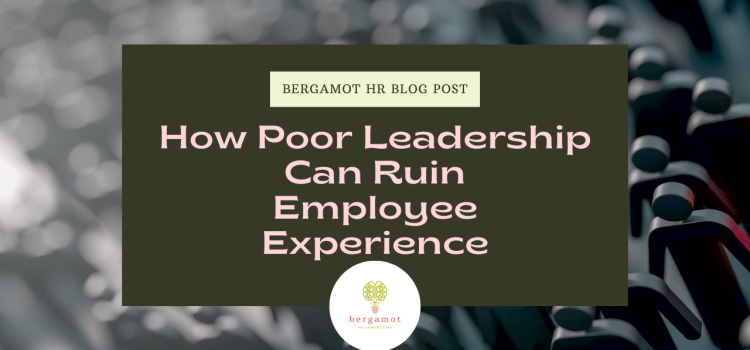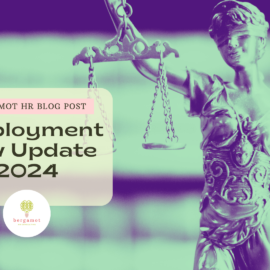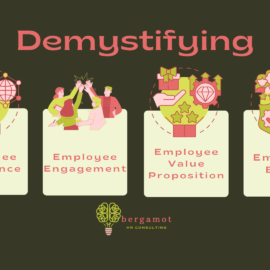
How Has Your Employee Experience Been?
Have you ever worked for a company where you felt like just another cog in the machine? Where your work was just a meaningless means to an end, and your managers didn’t seem to care about your wellbeing or development? What I have just described is a very poor employee experience. Increasingly, people are expecting a consumer-level experience when it comes to their employment, and providing a great employee experience is critical to win the war for talent and to remain competitive.
What Is Employee Experience?
Employee Experience is all about the work we do, the teams we’re on, our direct managers, and how they coach and support us. But it’s also about so much more than that. It’s about our health and wellbeing, the digital, physical, and cultural workplace, and how much we trust the organisation and its leaders.
Companies that do the employee experience exceptionally well put their mission and purpose first. Trust is vital. When people don’t trust your company, you have to offer a lot of money and perks for them to even consider joining you—and, even if they do, you may not be able to hold on to them. But when employees feel valued, supported, and empowered, they’re more likely to stay with the company long-term and contribute to its success.
Engagement is an important outcome of a great employee experience, but it’s not the only one. There’s no doubt more engaged people are happier, more productive, and provide better service to customers. But companies focusing on the right Employee Experience strategies and practices have better outcomes across the business, people, and innovation. Employee Experience is about trust, transparency, caring, and empathy. It’s about leadership and culture, growth, communities, and equity.
What Happens If Your Company Provides a Poor Employee Experience?
Sadly, many employees suffer from poor leadership, which can ruin their Employee Experience and cause them to feel frustrated, demotivated, and unhappy at work. Poor leadership can take many forms, such as incompetence, arrogance, rudeness, micromanagement, lack of communication, lack of feedback, lack of recognition, lack of trust, and lack of support.
Poor leadership can ruin the Employee Experience, impacting engagement and all the positive business outcomes that brings. To bring this to life, I have chosen two wonderfully awful fictional leaders to illustrate the point! Introducing Basil Fawlty and David Brent…
David Brent and Basil Fawlty are two iconic characters from British sitcoms, who are known for their incompetent and arrogant management styles. They both own and/or run businesses, a hotel and an office, but they often fail to provide a positive and supportive work environment for their employees. They also have a tendency to insult, humiliate, and annoy their customers, suppliers, and guests.

Basil Fawlty "Fawlty Towers"
Basil Fawlty is the owner of the Fawlty Towers hotel in Torquay. He is a cynical, rude, and snobbish misanthrope, who despises his guests, staff, and wife. He is obsessed with attracting upper-class customers, but he lacks the skills, manners, and resources to do so. He is also prone to panic, anger, and violence, often losing his temper and lashing out at anyone who annoys him. He is also dishonest, cowardly, and hypocritical, often lying, cheating, and grovelling to get out of trouble. He has no empathy, compassion, or gratitude for his employees, customers, or suppliers, and treats them as nuisances or enemies.

David Brent "The Office"
David Brent is the manager of the Slough branch of Wernham Hogg paper merchants. He is a self-deluded, egotistical, and insensitive snob, who thinks he is a great leader, comedian, and musician, but in reality, he is none of those things. He constantly annoys and insults his staff with his inappropriate jokes, remarks, and actions. He is also incompetent, lazy, and dishonest, often neglecting his duties, blaming others for his mistakes, and lying to his superiors. He has no respect for his employees, customers, or suppliers, and treats them as inferiors or obstacles to his own ambitions.
So How Do They Fail As Leaders To Create A Great Employee Experience?
Well, in every way, actually!
❌ Communication: Employees want to feel heard, understood, and valued by their leaders and peers. However, David Brent and Basil Fawlty are both terrible communicators, who often interrupt, lie, exaggerate, or make inappropriate jokes and comments. They also fail to listen, give feedback, or recognise their employees’ achievements. As a result, their employees lose trust and respect for them, and feel demotivated and unhappy.
❌ Leadership and competence: Employees want to have a clear vision, direction, and purpose for their work. However, David Brent and Basil Fawlty are both clueless and inconsistent leaders, who lack the skills and knowledge to run their businesses effectively. They also have a high ego and a low self-esteem, which makes them insecure, defensive, and paranoid. They often blame others for their mistakes, take credit for their successes, and avoid any responsibility or accountability. As a result, their employees lack guidance, confidence, and empowerment.
❌ Culture: Employees want to work in a culture that is positive, collaborative, and innovative. However, David Brent and Basil Fawlty create a culture that is negative, dysfunctional, and stagnant. They often create conflicts, tensions, and divisions among their employees, and discourage any creativity or initiative. They also have a rigid and outdated mindset, which makes them resistant to change, diversity, and improvement. As a result, their employees feel frustrated, bored, and isolated.
❌ Growth: Employees want to feel like they’re learning and developing new skills. Providing opportunities for growth and development can help employees feel more engaged and invested in their work. Unfortunately, David Brent is a classic example of a manager who fails to provide growth opportunities for his employees. He’s more concerned with his own ego and self-promotion than with helping his team members succeed.
❌ Communities: Feeling like you’re part of a team or community can be incredibly motivating. When employees feel like they’re part of something bigger than themselves, they’re more likely to be engaged and committed to their work. Basil Fawlty from “Fawlty Towers” is a great example of a manager who fails to build a sense of community among his employees. He’s rude, dismissive, and often treats his staff like they’re beneath him.
❌ Equity: Employees want to feel like they’re being treated fairly and that their contributions are valued. Providing equitable opportunities for growth and advancement can help employees feel more invested in their work and committed to the company’s success. Unfortunately, both David Brent and Basil Fawlty fail miserably when it comes to equity. They both show favouritism, and treat some employees much better than others. And Basil’s casual racism towards his employees and his guests is breathtaking.
❌ Trust and transparency are vital for a great employee experience because they help build a sense of security and confidence among employees. When employees feel like they can trust their managers and that the company is transparent about its goals and operations, they’re more likely to feel invested in their work and committed to the company’s success. Unfortunately, both David Brent and Basil Fawlty fail miserably when it comes to trust and transparency. David Brent lied to his team about the potential office closure and redundancies. Basil Fawlty puts his employee, Polly, in a terrible situation by making her dress up as his wife and pretend to be sick to trick his friends. In fact, I think Polly is forced to lie to Basil’s wife, friends or guests in most episodes! Both generally create an environment of suspicion and mistrust.
❌ Care and empathy are also essential for a great employee experience because they help employees feel valued and supported. When managers show that they care about their employees’ wellbeing and are empathetic to their needs and concerns, employees are more likely to feel engaged and committed to their work. Unfortunately, both David Brent and Basil Fawlty fail miserably when it comes to caring and empathy. They both treat their employees poorly, belittle them, and generally show little regard for their feelings or needs.
Both David Brent and Basil Fawlty create a toxic work environment, where employees feel disrespected, demoralised, and dissatisfied. They also damage the reputation and performance of their organisations, by alienating customers, suppliers, and stakeholders. They are the opposite of what good leaders should be: competent, humble, respectful, supportive, communicative, feedback-oriented, recognition-oriented, trusting, and empathetic.
How Can A Leader Create A Great Employee Experience?
I can’t end this blog post on a negative note, so here is an antidote to David and Basil’s terrible leadership. Here is a fictional character who is doing leadership right:

Hermione Granger "Harry Potter"
Hermione is one of the best friends and allies of Harry Potter. She is a brilliant, brave, and loyal wizard, who excels in academics, magic, and activism. She has the following characteristics as a leader:
🌟 She is competent in her field of expertise, which is magic. She is the top student in her year, and knows a vast amount of spells, charms, potions, and other magical subjects. She is also able to apply her knowledge and skills in practical situations, such as solving puzzles, fighting enemies, and saving lives.
🌟 She is humble about her achievements and abilities, and does not boast or brag. She acknowledges her mistakes and weaknesses, and learns from them. She does not seek fame or glory, but rather serves the greater good of the wizarding world and beyond.
🌟 She is respectful of the diversity and dignity of all beings, and treats everyone with courtesy and kindness. She does not discriminate or judge anyone based on their blood status, race, culture, or beliefs, but rather appreciates and celebrates their differences. She also respects the autonomy and sovereignty of other communities, and follows the rules and laws of the society she lives in.
🌟 She is supportive of her friends and allies, and provides them with the resources, guidance, and opportunities they need to grow and excel. She helps Harry and Ron with their homework, studies, and personal problems. She also mentors and coaches other students, such as Neville Longbottom, Luna Lovegood, and Ginny Weasley. She also stands up for and protects her friends and allies, even when they are in danger or in trouble.
🌟 She is communicative with her friends and allies, and keeps them informed and updated on the situation and the plan. She listens to their opinions and suggestions, and values their input and feedback. She also communicates clearly and effectively with other parties, such as teachers, authorities, and adversaries, and establishes rapport and trust with them.
🌟 She is feedback-oriented, and seeks to improve herself and her performance. She welcomes constructive criticism and advice, and acts on them. She also gives feedback to her friends and allies, and praises them for their achievements and efforts. She also recognises and rewards their contributions and accomplishments, and celebrates their successes.
🌟 She is trusting of her friends and allies, and empowers them to make decisions and take actions. She does not micromanage or control them, but rather gives them autonomy and flexibility. She also trusts them to do their best and to be loyal and honest. She also earns their trust by being reliable and consistent, and by keeping her promises and commitments.
🌟 She is empathetic of her friends and allies, and understands their feelings and emotions. She cares about their well-being and happiness, and supports them in times of need. She also empathises with other beings, and tries to see things from their perspective and to understand their motives and values.
As a result of her leadership, Hermione inspires, engages, and motivates her friends and allies, and creates a positive and productive environment. Her friends and allies are loyal, dedicated, and passionate, and they respect and admire her. They also work together as a team, and collaborate and cooperate with each other. They also achieve remarkable feats and outcomes, such as defeating Lord Voldemort, reforming the Ministry of Magic, and advancing the rights of magical creatures. Hermione is a leader who makes a difference, and who leaves a legacy.
Employee Experience: Final Thoughts
Employee experience is not only about perks and benefits, but also about how you treat your employees as human beings.
David Brent and Basil Fawlty show us what not to do to create a great employee experience, and how their poor leadership and management skills negatively affect their staff and their business.
Be more Hermione and create a positive and supportive work environment, where your employees feel valued, engaged, and empowered. This will not only improve their well-being and performance, but also your customer satisfaction and bottom line.
How is the employee experience in your organisation? Get in touch if you’d like to have a chat about it to see how I could help you understand how you are doing and how you could make it even better.



